Deal with Turkey, Five Principles of Policy towards Russia, New Tension between Serbs and Croats
Adelina Marini, March 23, 2016
Last week was a stormy week in the EU. Leaders of member states have surprisingly easy approved the deal with Turkey, according to which it looks like the EU is not fully selling its soul. Although the main principles of the framework, agreed on a week earlier remain, the Union did not step away from its principles. The visa regime will not be lifted if Turkey had not fulfilled all requirements for it, and there are 72 of them. No negotiation chapters will be opened if they will force a compromise with European agreements. The EU finally agreed to Ankara’s idea from months ago for the creation of security areas in Syria along the border with Turkey. The only issue that continues to be the most important part of the deal is the return of refugees from Greece back to Turkey.
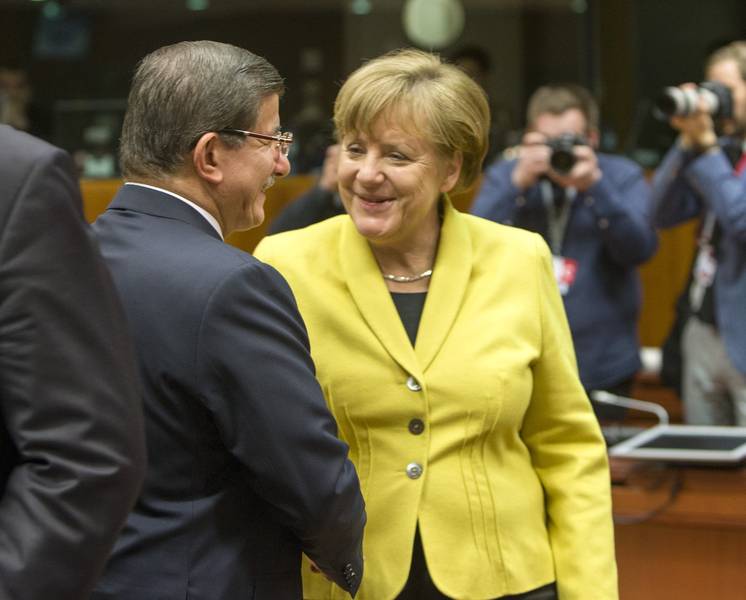
It is riding on the edge of international law and at this point is difficult to implement due to purely logistic reasons. The deal will hardly solve Europe’s refugee problem, but will surely provide temporary relief. How will it be used is extremely important, because leaders admit in the agreement that they expect the opening of new routes. Most leaders continued repeating over the last week that the main purpose of the deal is to put an end to the “business model” of human traffickers. In the second day of the March 17-18 summit the International Organisation for Migration published a survey, according to which one of every ten migrants and refugees answers positively to the question on human trafficking and other similar practises on the East Mediterranean route.
The survey was conducted in six countries along the route – Croatia, Greece, Macedonia, Hungary, Serbia, and Slovenia. 7.2% of responders answered “yes” to at least one of the indicators for trafficking and other exploitation practises, including work with no wages during the trip, arranged marriages, forcible detention, etc.
Russia – still as unifyingly divisive
The eleventh week of the year passed almost entirely under the sign of the Thursday and Friday summit. Another important thing happened, however, on March 14. The foreign ministers of the Union agreed on five principles in EU’s policy towards Russia, which are nothing new per se, but show that unanimity of foreign policy is still questionable. The five principles are: implementation of the Minsk agreement, which remains the key condition for a possible change of the EU’s position towards Russia; strengthening the relations with the Eastern partners and other neighbours of the EU, especially in Central Asia; strengthening the resilience of the EU regarding energy security, hybrid threats, and strategic communication; selective cooperation with Russia on issues of the EU’s interest; enhancing people to people contacts and support for Russia’s civil society.
If Croatia had Charlie Hebdo....
There were several key issues in Croatia over the week of March 14-20: the next episode of the media domestication saga; an attempt at placing control over the central bank; the visit of Prince Charles and Camilla, Duchess of Cornwall. Unfortunately the media crackdown continued with the resignation of the boss of the Croatian Council for Electronic Media (CEM), Mirjana Rakić. Her motives cite unbearable political pressure on her personally and on the CEM. The European Commission announced it was monitoring closely the situation in Croatia by pointing out that it is planning changes in audio-visual rules, for they do not provide for enforcing the independence of media regulating authorities and this obviously is imperative and is a problem.
Alas, the week did not end with just this resignation. The satire show Montirani proces (Edited process), which was airing on Croatian national television, was taken off air. The television’s management, dismissed two weeks prior, gave explanations on the case, which coincide with the concerns of liberal circles in the country that there is a cultural revolution coming: “The programming management of the HRT based its decision on the fact that in part of the screenplay “Edited process” mentions content, which is unsuitable for airing on the HRT, and believes that the satire programme is being misused for igniting religious, national, and other intolerance”.
Also last week, the non-governmental organisation GONG published its report [in Croatian] for February from the monitoring of hate speech, discriminating, stereotyping, or flaring speech in Croatian information media. In February, the new government started its work. Statements by politicians are cited in the report, including by President Kolinda Grabar-Kitarović, which are assessed as unmeasured and provocative, attention is paid to the contents of commentaries under certain articles and the fact that some media with a pronounced conservative inclination in some cases criticise hate speech, but tolerate it in others. Depending on the point of view.
There were appeals last week in Croatia for changes in the law on the Croatian national bank, with which it is to be forced to report to parliament. The appeals came from the ruling coalition. In an interview for Bloomberg Prime Minister, Tihomir Orešković firmly stated that monetary policy should be independent, as it is in all European states. “In the last few years, when Croatia has gone through a crisis, the stability that the central bank has provided has been critical. We have a very strong euro-denominated society, so we should focus on productivity and adding value, not on depreciating the kuna”, he said.
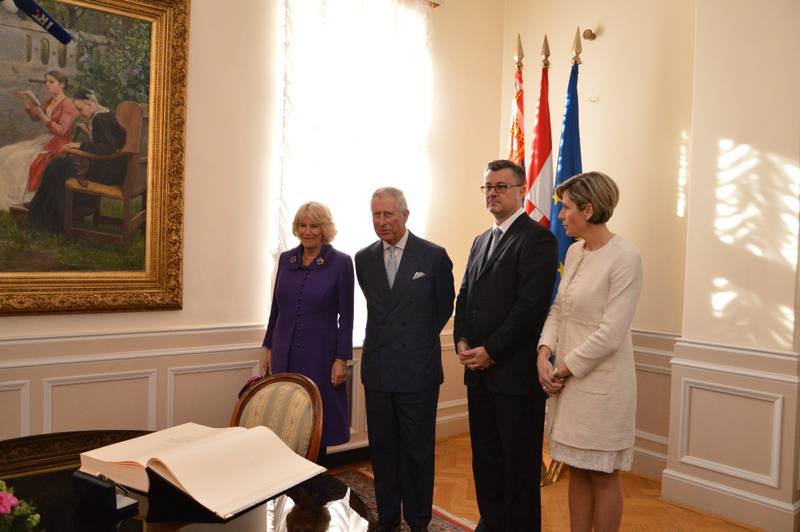
Instead of uniting the former Yugoslavia countries, Prince Charles had them arguing again. Despite his pleas for unification and peaceful future during the Balkans tour he did last week, Serbia and Croatia managed to get into an argument again and once more increase the tension between them, contrary to the beliefs of Serbian PM Aleksandar Vučić that working with the new government in Zagreb will be considerably easier. Croatia was the first stop in their royal highnesses’ Balkan tour. In Zagreb, the Prince visited the Croatian government building. He was shown the exact spot where it was damaged by Yugoslav rocket bombings in the beginning of the 1990’s. This angered Serbian PM Aleksandar Vučić, who claimed this was not fair. “How would it look if we took Prince Charles throughout Serbia, for there is not a single village, where we will not find Serbian refugees from Croatia”.
Charles’ visit was not the only reason for raising tension between Belgrade and Zagreb. Last week the International Criminal Tribunal for the former Yugoslavia made an unprecedented decision to announce a ruling, for the first time, in the defendant’s absence. Word is of the leader of the Serbian Radical Party Vojislav Šešelj, who was released by the Hague tribunal two years ago due to medical reasons and although the tribunal requested his second return, it has not happened yet. Croatia was outraged at this decision and announced that it would block the opening of a key chapter of the negotiation process with Serbia – number 23 “Judiciary and fundamental rights”. Šešelj is not the only reason for the veto. Zagreb has two more conditions in order to lift its block – Serbia respecting its national minorities and changing the controversial law for universal jurisdiction, which allows Serbia to lead processes for war crimes outside its territory.
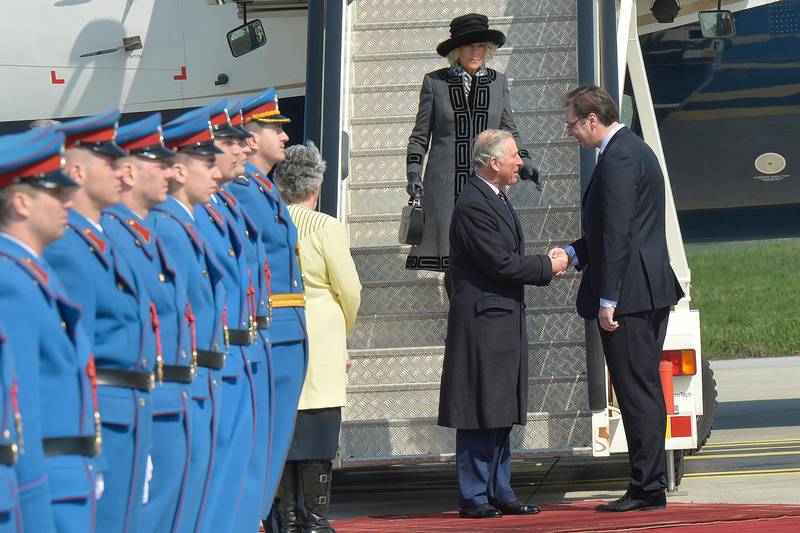
Reactions were heavy in Serbia. According to First Deputy Prime Minister and Minister of Foreign Affairs Ivica Dačić, there are many more Šešelj-s in Croatia, than in Serbia. Similar statements came from other members of the Aleksandar Vučić government. Chapter 23 is of those chapters that the negotiations process cannot start without, for they cover the hardest criteria to meet. Serbia started its negotiations officially at the end of last year, but not with the opening of these chapters. It does, however, count on opening 23 and 24 in June. 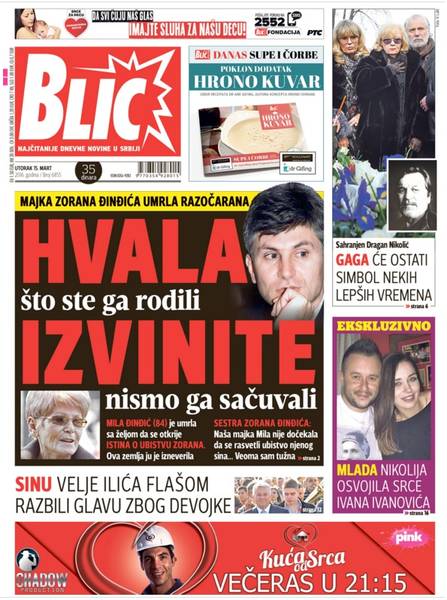 Croatian Foreign Minister Miro Kovač pleaded not to mix up the negotiations process with the election campaign. Serbia is at the moment in the middle of the campaign for the April 24th preliminary elections.
Croatian Foreign Minister Miro Kovač pleaded not to mix up the negotiations process with the election campaign. Serbia is at the moment in the middle of the campaign for the April 24th preliminary elections.
Last week in Serbia, the 13-th anniversary of the murder of Prime Minister Zoran Ðinđić was commemorated. On this occasion the Serbian Blic had a survey among its readers with the question whether the murder will ever get solved. 50% of respondents reply with “Never”, 28% think that after 50 years, maybe, it will become clear who was behind the murder, and 13% believe that everything is already known.
Bulgaria in the curved CVM mirror
The leading subject in Bulgaria last week was the discussion of this year’s report of the EC on the Cooperation and Verification Mechanism (CVM), with which the country was accepted in the EU on January 1st, 2007. The discussion in the parliamentary Committee on Civil Liberties, Justice, and Home Affairs turned into a campaign for the lifting of the mechanism, as euinside reported. Foreign Minister Daniel Mitov stated in several interviews on the subject that the mechanism cannot be lifted until all requirements are met. “From their very creation the mechanisms are different, they have different purposes. We know what the latest report on Romania is, as well as the one on Bulgaria, and in neither of them there is by no means any notion of full compliance with the requirements. So, there is no way the mechanism will be lifted neither for Bulgaria, nor Romania at this stage”, said Minister Mitov in an interview for 24 Chasa newspaper.
Later, Prime Minister Boyko Borissov thanked in front of BNR [in Bulgarian] the MEPs, who fought for the removal of the mechanism, but stated that it is highly effective and he supports it. Hi did not omit picking at Romania, which two years in a row enjoys a very good report on the CVM, by saying that Bulgaria will have all requirements met in two and a half years, but not at the cost of having “our statesmen running around Europe looking for citizenship”, envisaging Romanian ex-President Traian Băsescu, about whom there were publications last week that he applied for a Moldavian citizenship in order to avoid prosecution in Romania.
The General Prosecutor of Bulgaria, whose institution is the most criticised in the EC report of January of this year, however, stated that the CVM is “a formal procedure”, which “is unfortunately turning more and more into a tool for internal political confrontation. The Mechanism is being used by some political powers for criticising others, or figures in the judiciary”. Sotir Tsatsarov attacked heavily media as well, which criticise him.
In the meantime, the past week marked one more episode of the conflict between two of the coalition partners in Bulgaria's government – the senior partner GERB (EPP) and the junior Reformist Block (some parties in it are EPP members). After the Reformists kept on being both in opposition and in power for weeks, with all resulting consequences, there came a call from GERB to PM Borissov for their removal from government. The PM himself said in Brussels that, at the moment, he is not thinking about changing ministers. It is still too early to say whether this latest episode will lead to government instability.
A law against hate speech in Bosnia and Herzegovina
Last week Al Jazeera Balkans reported [local language] that preparation has began of a law forbidding the dissemination of hatred. The bill being prepared aims at explicitly defining which organisations are Fascist, but some MPs from Republika Srpska are opposed. Member of Parliament Senad Šepić of the Party for Democratic Action thinks that such a law will give opportunity for all organisations, regardless of which ethnic group or which part of BiH they come from, to be banned in the country, if they disseminate hatred.
Another important issue in BiH last week was the continuing quarrel on how should the 2013 census results be accounted. Last week, the negotiations for reaching an agreement on the processing of data from the census failed. The legal deadline for the announcing of census results expires on July 1st. One of the most controversial moments is whether to count those, who live in BiH temporary due to work or education. This is what Republika Srpska insists on. RS President Milorad Dodik threatened that if the census results for BiH are not published, he will announce the results of the census in RS.
Translated by Stanimir Stoev
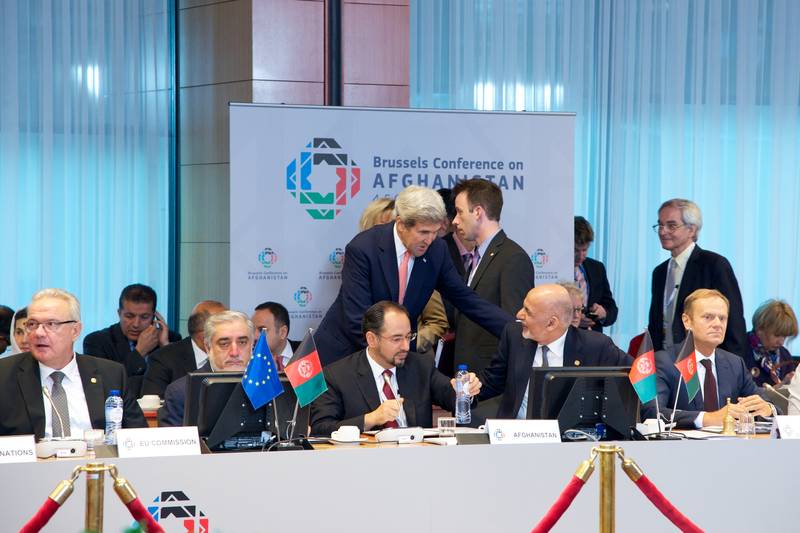 | © Council of the EU
| © Council of the EU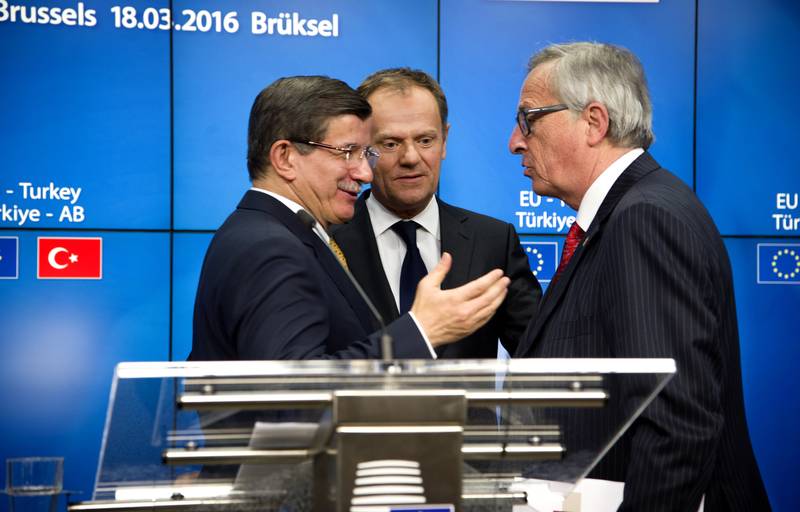 Davutoglu, Tusk, Juncker | © Council of the EU
Davutoglu, Tusk, Juncker | © Council of the EU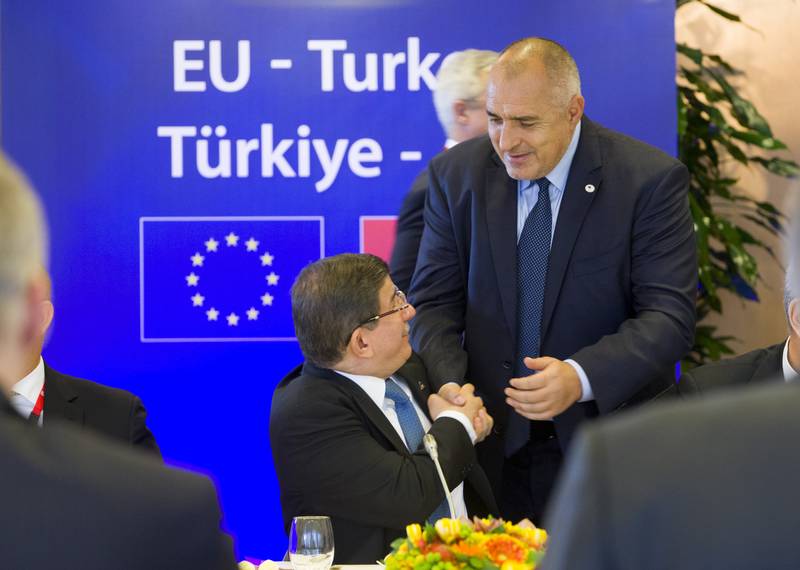 Ahmet Davutoglu, Boyko Borissov | © Council of the EU
Ahmet Davutoglu, Boyko Borissov | © Council of the EU Entrance to the Berlaymont building | © EC - Audiovisual Service
Entrance to the Berlaymont building | © EC - Audiovisual Service | © European Union 2020, EC - Audiovisual Service
| © European Union 2020, EC - Audiovisual Service Commission President Ursula von der Leyen | © European Union 2019 - Source: EP
Commission President Ursula von der Leyen | © European Union 2019 - Source: EP Kolinda Grabar-Kitarovic | © KGK
Kolinda Grabar-Kitarovic | © KGK Jozo Rados | © European Parliament
Jozo Rados | © European Parliament Aleksandar Vucic, Andrej Plenkovic | © Vlada RH
Aleksandar Vucic, Andrej Plenkovic | © Vlada RH